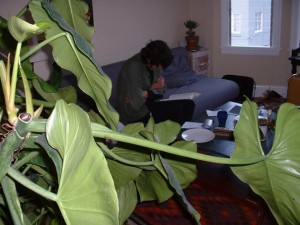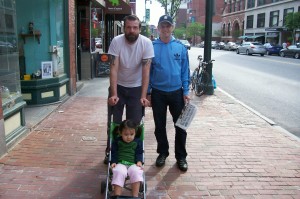Our Occupations (after the Occupations): Whitener and Owens
BY Thom Donovan


Brian Whitener and Richard Owens are up next in a series of posts for National Poetry Month regarding how writing and art practices have changed in response to the occupations. You can read the first set of responses, from Stephen Collis and Steve Benson, here. The following two paragraphs contain part of the prompt I provided to participants:
Something I am wondering about kind of broadly is how your practices might have changed since the beginning of the occupations, if we can mark this beginning in the fall of 2011 (the occupations obviously having their immediate precedent in the Middle East and Europe).
Do you think it may be possible to speak to this a bit? […] Succinctly, in a paragraph or two? Maybe it has had no perceivable effect, which is fine of course, and in which case you might talk about why it is important to maintain what you are doing parallel to (or beyond?) current social movements and political events.
BRIAN WHITENER
Two kinds of on-going questions. First, writers continue to write: does “practice” need to change? Some writers continue to write while organizing. Most writers continue to just write. If we argue that text and world are not ontologically contiguous, does this imply a split between the roles of writer and militant? Writing assumes systems of production and distribution. Do those systems need to become objects of intervention? If they did, would this necessitate the emergence of a set of non-textual practices in the “literary” field? Second, what is the cultural world we want to live in? Does framing the question in this way already assume a kind of classical liberal separation between art, the social and the economy? Despite the involvement of writers in occupy movements, the dominant cultural imaginary among experimental-identified writers continues to be that of small artisanal production. What is the world we want to live in? What would be the position of what is (was) known as the aesthetic in this world? If we feel what we write is important, or potentially important, do we need to wage a war of position towards cultural hegemony as opposed to assuming (falsely) that a limited public sphere exists and that “work” will eventually make a long march through the institutions?
RICHARD OWENS
The other day I overheard my wife reading one of Oscar Wilde’s fairy tales to our little one. I had no idea the story was from Wilde until well after—and for all I knew, the story could just as easily have been written by Kenneth Grahame or A.A. Milne—but what struck me at that moment was a brief passage I heard read aloud: “Spring has forgotten this garden … so we will live here all the year round.” Within the frame of the tale’s narrative the statement makes a particular type of sense, but in the instant I heard it uttered I found myself stunned by how the words hung in the air, radically disembodied from their narrative and thus making, at least to me, another type of sense. In the simplest way, the passage reminded me of Thomas Paine’s riposte to Thomas Jefferson: “Where freedom is not, there is my country.” But more than the struggle to realize a perniciously vacuous concept like freedom or any other kind of specious ideal compatible with capital and identified with western democracy, the commitment to inhabiting a garden spring has rudely forgotten seemed to me a commitment to inhabiting a space that does not, and may likely never, yield fruit. And according to this logic, anyone who makes this kind of commitment must necessarily confront—from moment to moment, instant to instant—the unrelenting terror of that possibility: No milk today. Nor tomorrow. Nor the day after that.
Thinking at one and the same time about activism and writing practice, the advantage of such a commitment and such a thinking (no milk today or ever) is, I think, manifold. Most immediately, this thinking allows us to circumambulate the language of failure and failure’s despicable corollary, success—that is, if we are suspended in struggle and struggle is sustained, as I believe it always already is, even across signal instants that either discourage or reaffirm our various commitments, then there is no winning or losing, no succeeding or failing. What we have instead is a flickering but nonetheless enduring attention that extends itself through the ineradicable recurrence of conflict and antagonism.
Our habit of toggling the differential meanings of the word “occupation” troubles me a good deal and while it’s not a word or concept I would easily relinquish, particularly at this conjuncture, it’s worth attending to the contradictory uses of occupation—i.e. our tendency to address, occasionally in the same breath, the occupation of Iraq and the occupation of Zuccotti Park or Dewey Square—and I wonder now if it’s possible to reappropriate and fully recuperate a concept like occupation without dragging along the logics of domination, imperialism and ownership, collective or otherwise. The garden, even and especially when abandoned by the regenerative forces of spring, is there, we are within it, and within it and not elsewhere are the conditions for its transformation. In other words, on the scorched earth of globalization there’s no place like home, and if the moment of occupation in the US hasn’t effected a remarkable change in my approach to writing—or, perhaps more importantly, my interest in the ongoing efforts of my comrades—it has most definitely amplified my affection for the work of others engaged in a variety of struggles on a variety of scales.
Thom Donovan lives in New York City where he edits Wild Horses of Fire weblog (whof.blogspot.com) and...
Read Full Biography

